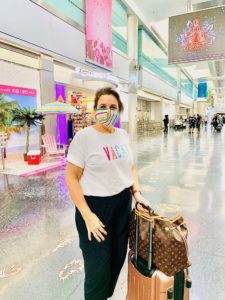For many, it’s been two years since traveling, all due to the COVID-19 pandemic. It seems like people are yearning to travel now more than ever since being cooped up for so long. Fortunately, vaccines and stricter protocols are helping to make traveling safer than it was when the pandemic first broke out.
 Is it safe to travel internationally? Difficult to travel? These are frequent questions I receive from my travel clients lately. The honest answer depends on many factors—whether you’re vaccinated or not (a completely personal choice), where you’d like to go, travel requirements and safety protocols of the destination, number of COVID-19 cases at the destination, and so much more.
Is it safe to travel internationally? Difficult to travel? These are frequent questions I receive from my travel clients lately. The honest answer depends on many factors—whether you’re vaccinated or not (a completely personal choice), where you’d like to go, travel requirements and safety protocols of the destination, number of COVID-19 cases at the destination, and so much more.
I believe that there are things you can do to help protect yourself if you plan to travel at this time.
But first, let me clarify that I’m neither a medical professional nor COVID-19 expert. I am, however, a travel professional who has traveled from the U.S. to the Caribbean on 5 different trips to 5 destinations during these COVID times. And there are extra precautions I’ve taken that I believe helped me prepare well for my travels, stay healthy and protect my vacation. (In case you’re wondering… I traveled non-vaccinated for the first three trips mentioned, and vaccinated for the latter two once the vaccine became available to me.)
Today I’m sharing what I have done (and continue to do) before, during, and after I travel in order to protect myself and my vacation plans. I hope you’ll find these next 18 tips helpful!
COVID Travel Tips Before, During, & After Your Vacation
Before you travel…
TIP #1: Choose a hotel/resort location that offers on-site COVID testing and can provide accommodations for an extended stay for quarantine in the event you test positive for COVID while on vacation.
TIP #2: Make sure you have travel protection that covers “cancel for any reason” or includes a special COVID-19 provision. If all else fails and you can’t travel due to COVID, at least you’ve prepared yourself by having the right travel protection in place to cover trip cancellation or postponement if necessary.
Tip #3: Isolate yourselves as best as you can during the 7-14 days before your trip. It’s good common sense that less exposure to people gives you less chance of exposure to COVID. Try to avoid social gatherings, eating in restaurants, and shopping in stores before you travel.
Tip #4: Bulk up your immune system before, during and after your trip. Eat vitamin/mineral-rich whole foods. Take supplements that might give you an extra boost such as Vit C, Vit D, and Zinc (educate yourself about options and check with your doctor first). And drink plenty of water.
Tip #5: Bump up your “clean-hands-campaign.” Wash/sanitize your hands frequently (especially when in public and getting back into your car), and don’t share hand towels at home. Keep shared surfaces sanitized such as light switches, handles, door knobs, remotes, etc.
Tip #6: Get enough rest. Regularly getting a good night sleep has tons of health benefits such as renewing cells, reducing stress, and boosting your immune system.
TIP #7: Be aware of the most current travel requirements and COVID restrictions for the destination you’ll be traveling to, as well as the requirements for your return home. In addition to passports, many destinations require COVID testing prior to arrival and specific travel authorizations to be submitted for approval. Some will not allow travelers entry if they are not fully vaccinated against COVID-19. Currently, the U.S. requires COVID testing (or documentation of recovery from COVID-19) for all air travelers entering (or re-entering) the U.S., age two or older.
TIP #8: Treat yourself to some airline upgrades. Purchase seats that are closer to the front of the cabin for quick exit upon arrival. Choose the window seat if possible, and avoid sitting in the aisle seat where people will continue to pass you and potentially make contact with you.
TIP #9: Purchase expedited airport arrival service. This service separates you from the mass of people and gets you quickly processed and out of the airport. When you can get off of the plane and be separated from the group, you’ll spend less time in the airport for checkpoints and have less exposure to others.
During travel…
TIP #10: Besides sanitizer for frequently cleaning your hands, keep sanitizing wipes for surfaces readily available, and be diligent about keeping your surroundings clean. Wipe off your tables and seats in the airport and at restaurants. Wipe down EVERYTHING you’ll touch while seated on the plane (and don’t forget the air vents, light controls, and chair pocket in front of you—which I don’t recommend you use for your personal items). When you arrive at your hotel room, sanitize all surfaces you’ll touch such as drawer handles, door knobs, light switches, remotes, phones, etc.
TIP #11: Avoid touching food with your hands while traveling. Pack snacks that can be eaten without being touched (things in wrappers like granola bars) or foods that can be eaten with utensils.
TIP #12: Bring multiple face masks in case one gets dirty or lost…or your travel partner forgets theirs. They are currently required in all airports, on planes, and in indoor public areas in most destinations.
TIP #13: Keep air vents open while on the plane, even if it gets too cold. This helps the air circulate through the air filtration system more efficiently and gives you freshly cleaned air to breathe. Air filtration systems on planes are highly rated for reducing germs and viruses.
TIP #14: Forego the daily housekeeping service in your hotel room. Less people coming into your room means less exposure and less chance of someone else’s germs being left behind.
TIP #15: When dining at restaurants, opt for outdoor seating when possible so you’ll be in the fresh flowing air. To help avoid the spread of germs, view the menu through the bar code (if it’s an option) via your phone instead of touching the printed menu. Go to the bar yourself to get your cocktail so you can avoid an additional person (aka: your server) touching and breathing over your glass.
After you travel…
TIP #16: When you arrive at your destination (and after you’ve returned home), change out of your travel clothes right away, and shower off all the germs you may have picked up along the way.
TIP #17: Once you get back home from vacation, isolate for a few days (up to 10 if you can) to protect others. Symptoms of COVID or other illness can start to show within about 3-4 days.
TIP #18: If you’ve traveled as a couple or as a family, have someone in your group take a COVID test 3-5 days after returning. It’s a good gauge to see if anyone has possibly been exposed.
Keeping my clients informed about all of the things mentioned in my tips is a big part of what I do to save them time and simplify their vacation planning. I hope these tips encourage you to satisfy your wanderlust by safely getting out there and enjoying life in this big beautiful world we live in.
BONUS TIP: If the thought of planning and booking and keeping track of all the details for a vacation yourself seems overwhelming, enlisting my help might be just what you need. Reach out to me here for a 30-minute discovery call, and let’s get your vacation plans started!
Wishing you safe & happy travels,
Christine
About the Author:

Christine Terezakis is the founder and owner of Dreamday Destinations. She has over 16 years of experience in the wedding and travel industry as an Accredited Master Wedding Planner, Destination Wedding Travel Advisor, Certified Sandals and Beaches Resorts Specialist, and AM Resorts Master Agent. Christine combines her wealth of experience, passion for weddings, and love of travel to inspire, guide, and serve travel-lovers who enjoy the ease and luxury of all-inclusive resorts, and couples who are planning their dream destination weddings and romantic getaways throughout the Caribbean and Mexico.
FOLLOW US:
Instagram: @dreamdaydestinations
Facebook: Dreamday Destinations

